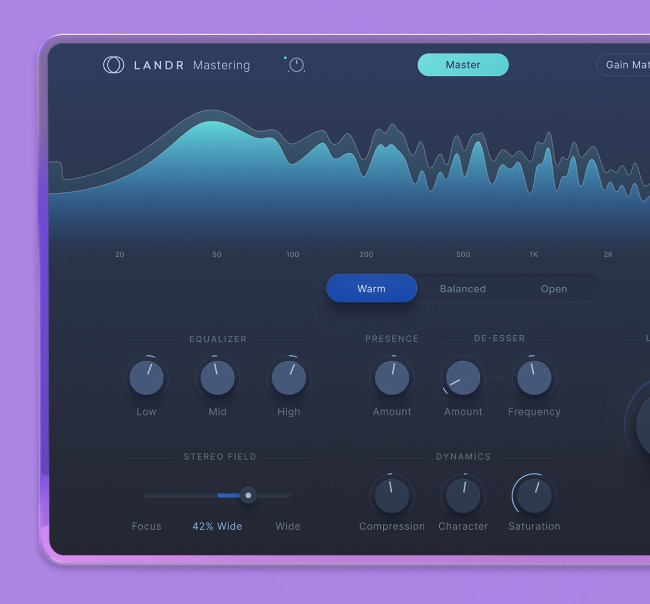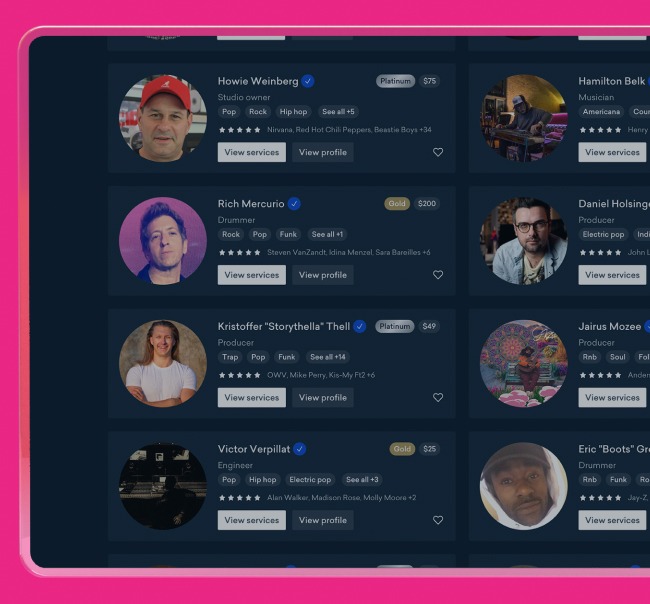Audio Engineers: What Do They Do and How to Become One?

If you’ve ever wondered what goes on behind the scenes to produce top 40 music productions, you’d better ask a professional audio engineer.
Today’s biggest artists wouldn’t sound how they do if they didn’t work with the best of the best audio engineers the industry has to offer.
So if you’re an emerging producer or if you’re wondering how to become an audio engineer, it’s a good idea to get up to speed with what exactly this role does to produce quality recordings.
In this article, we’ll answer the question, “What does an audio engineer do?” We’ll also explore the career path for becoming an audio engineer and a handful of cases where you might want to hire one—even if you’re on a budget!
Let’s dive in.
What is an audio engineer?
Audio engineers are music industry professionals that specialize in recording live audio, mixing, post-production and mastering. An audio engineer possesses the know-how to produce and finish recordings.
Typically audio engineers in music will have some college education or vocational training at a specialized recording studio, however, many audio engineers are also self-taught under the guidance of a mentor.
An audio engineer possesses the know-how to produce and finish recordings.
What does an audio engineer do?
Audio engineers can be contracted to record a variety of live sound recordings—this may range from orchestral performances, band performances, sound for film and television, field recording, live audio production and beyond.
In general, engineers in music are responsible for creating high-quality sound recordings that meet the expectations of the contractor whether that be an artist or another media producer.
Audio engineering involves a handful of basic activities, here’s a few of the specific tasks they’ll handle day-to-day.
Producing quality recordings
The most obvious part of an audio engineer’s job is the process of actually recording live sound.
Audio engineers must be experienced in miking techniques, signal routing and have the ability to understand what sort of recording setup is best for various live ensembles.
They also need to have some people skills to work with producers and artists to get the performances possible.
Mixing recordings
Once an audio engineer has successfully recorded quality audio it’s time to take the recordings in the mix room and begin shaping and molding the recordings into something near-complete.
This requires knowledge of various mixing practices including, EQ, compression, filtering, gain staging, effects, layering, pitch correction and much more.
Mixing engineers will often draft a first mix of a track or of an album and then make revisions based on the artist’s comments and requests.
Mastering the final mix
After a final version of a track or album’s mix is completed there’s one last step in how to engineer music—mastering.
This is a technical process that polishes each track to make it sound as good as it can on any speaker—it also makes each track compete in terms of loudness on streaming services and radio.
Essentially, mastering is the final step because it takes a mixed track or album and sets it up to sound as good as it can as a commercial release.
This special process is often done by professional mastering engineers with experience in professional audio mastering.
Hot tip: Human masters are very good, but they come at a high cost. LANDR offers online mastering tools that make it possible to get high-quality mastering done quickly and affordably.
Maintaining and managing a professional recording studio
The question of what an audio engineer does goes beyond making music. To record professional sound you need a professional studio and you need to manage said studio.
Audio engineers are responsible for overseeing the design and building of their studio, making sure it has all the necessary equipment and acoustically treating each of the rooms.
Of course, building a professional studio requires a significant investment—so an audio engineer will have to carefully budget for various expenses when building a studio.
Usually, this involves working with a team of engineers to create a business around the studio.
Once the studio is ready for recording, it’s up to the head audio engineer to keep it in good working order and keep bookings and contracts rolling in.
While the business side of being a professional audio engineer isn’t the most appealing part, there’s no doubt that it’s one of the most important parts of the job.
You won’t last long if your studio isn’t professionally built and managed, or if you’re not actively booking contracts and recording live performances.
You won’t last long if your studio isn’t professionally built and managed.
How to become an audio engineer
There’s no specific learning path required to become a professional audio engineer. It’s all about getting experience in the studio, working on many projects and finding a way to ultimately own, maintain and manage your own studio.
There’s no specific learning path required to become a professional audio engineer.
That said, there are some steps beginners can take to start learning how to be an audio engineer.
Learn the Basics
This doesn’t necessarily mean going to school.
Studying the practice of audio engineering at a recording arts school or university won’t hurt your chances and certainly will give you opportunities to build your network—but, just because you have a degree or certificate doesn’t mean you’ll find work right out of college.
You can also complete an online course or even “build your own” curriculum with books, magazine subscriptions, podcasts, YouTube videos and tutorials.
You’ll need to learn about music theory, studio recording, sound design, post-production and studio maintenance, plus how to use equipment like microphones and mixing consoles.
Build your studio
As with any musical skill, the best way to learn how to engineer music is to just do it. To do that, you’ll either need to find apprentice work in a pro studio or start working on DIY recordings of your own.
If you take the DIY route though, you’ll need a few pieces of home studio-friendly music production gear.
Don’t worry— a minimal home studio will do just fine when getting started. Here are the basics:
- Computer: You probably already have one of these, and you can use that for starters. Eventually, you’ll want a computer dedicated to audio engineering.
- DAW: Your digital audio workstation is where the recording, mixing and mastering magic happens. You can find a free DAW to start and then level up.
- Monitors and microphone: Studio monitors are speakers designed to give you more accurate sound for audio engineering. You’ll also need at least one microphone and stand.
- Headphones: Some professional audio engineers consider headphones optional, but they can be useful for mixing. Pro headphones are a good choice over monitors if you have a tight budget or temperamental neighbors.
- Audio interface: Your audio interface connects your computer and DAW to your speakers, microphones, instruments and headphones. There are options for all budgets and skill levels.
- Cables: Don’t forget your cables to connect it all together!
Check out our article “How to Build a Home Studio Setup” for more details on each of these pieces of equipment.
Practice, practice, practice
Mastering any aspect of music takes one thing: dedication. The more time you dedicate to becoming an audio engineer, the faster you’ll achieve it.
Many audio engineers get their start working as junior engineers in larger professional studios—or they hustle to build their name and studio by slowly building their network and portfolio.
Your best bet is to start working on your own projects—sometimes getting pro-bono experience is the only way to get your foot in the door, just be careful about being taken advantage of.
When to hire a professional audio engineer
If you’re an emerging producer who’s wondering whether it’s worth your time and money to hire an engineer—now you have an idea of the kinds of services they offer.
Of course, professional sound engineers offers their services at a variety of price points. Top-tier engineers may charge $300+ per hour, while others may charge per track or per revision.
If you decide to hire an audio engineer it’s definitely best to have a plan and know exactly what you need—it’s better for everyone involved if there’s a clear focus on what tasks need to be done.
For jobs that can be done remotely like mixing, where you might be able to simply send over a .zip file of recordings you can expect a lower price tag.
But, if you’re physically going into a studio and recording with professional gear, you should be ready to budget for something a bit more expensive.
Finding a good audio engineer can be challenging, especially if you don’t live in a major urban center.
Finding a good audio engineer can be challenging, especially if you don’t live in a major urban center.
Luckily there are online marketplaces that make it super easy to network and connect with hundreds if not thousands of audio engineers around the world.
LANDR Network for example, has a wide selection of incredible audio engineering talent all of whom offer a variety of services.
If you’re seriously considering hiring an audio engineer but aren’t sure where to look, definitely go browse the talent available to work for you on LANDR Network.
Best of all, LANDR Network creates an easy and safe space to collaborate and work on music remotely—so you can hire anyone anywhere and access the best from around the world.
The professional touch
Writing and producing music is hard, so you shouldn’t expect yourself to know everything about recording, producing and finishing a track professionally.
There’s no shame in hiring someone to help you get your tracks over the finish line—so why not treat your art with the respect it deserves and hire a professional audio engineer.
Learning how to be an audio engineer takes time and dedication, so if you’re just getting started with making music the best way to learn is by working on your own tracks—and sometimes hiring professionals when you need it.
Music-making is a journey and it takes time to learn how to engineer music and get a great sound.
Never stop learning and don’t be afraid to get the help you need when the time comes!
If you need a professional audio engineer, browse the talent available to work for you on LANDR Network.
If you want to become one, join LANDR so you can collaborate with pros in real-time, get exclusive tutorials and more.
Gear guides, tips, tutorials, inspiration and more—delivered weekly.
Keep up with the LANDR Blog.
Latest posts

